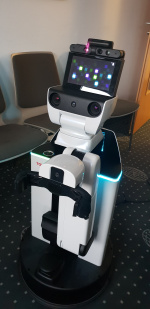This is an old revision of the document!
Table of Contents
BREW @RoboCup 2020
EASE is an interdisciplinary research center at the University of Bremen that investigates everyday activity science & engineering. Its core purpose is to advance the understanding of how human-scale manipulation tasks can be mastered by robotic agents. Within EASE, general software frameworks for robotic agents are created and further developped. These frameworks (CRAM, KNOWROB, GISKARD, and ROBOSHERLOCK) can also be applied to the RoboCup@Home context. There is further a substantial overlap in robot capabilities required to pass the RoboCup@Home challenges with what capabilities robots within EASE provide.
The V4R group at the Tecnical University of Vienna has long-standing experience of providing solutions to robot perception. The objective of the team is to make robots see and interpret the world. In other words, devising machine vision methods to perceive structures and objects such that robots act in and learn from everyday situations. This goal has led to core expertise in object tracking, detection, recognition, classification and pose estimation.
Motivation and Goal
UB competed in RoboCup@Home German Open in 2019, having focused on the Storing Groceries task. The system developed in the previous year is expected to be enhanced, through independent improvements and integration of TUW's perception suite. Beyond this, our system is expected to be competitive for other Housekeeper tasks of the competition. Serve breakfast in stage I and Set the table in stage II are very close to the research conducted by UB in its CRC EASE and thus will be a focus for the extension. The history of projects related to the home setting previously held by TUW provide a wealth of experience and motivation for the Clean Up task in stage I. Furthermore, the Find My Disk task in stage II is deemed achievable with our system. All these tasks require visual understanding combined with information management to handle queries and to formulate task-relevant actions. These aspects are precisely the strengths of the research conducted and the integrated system developed by UB and TUW.
Team

Daniel Beßler
danielb[at]uni-bremen.de
Patrick Mania
pmania[at]uni-bremen.de
Simon Stelter
stelter[at]uni-bremen.de
Timothy Patten
patten[at]acin.tuwien.ac.at
Kiru Park
park[at]acin.tuwien.ac.at
Relevant publications (2015 - 2019)
Michael Beetz, Ferenc Balint-Benczedi, Nico Blodow, Daniel Nyga, Thiemo Wiedemeyer, and Zoltan-Csaba Marton. RoboSherlock: Unstructured Information Processing for Robot Perception. In Proc. of IEEE ICRA, pages 1549–1556, 2015.
Zhou Fang, Georg Bartels, and Michael Beetz. Learning models for constraint-based motion parameterization from interactive physics-based simulation. In Proc. of IEEE/RSJ IROS, pages 4005–4012, 2016.
Michael Beetz, Daniel Beßler, Jan Winkler, Jan-H. Worch, Ferenc Balint-Benczedi, Georg Bartels, Aude Billard, Asil K. Bozcuoglu, Zhou Fang, Nadia Figueroa, Andrei Haidu, Hagen Langer, Alexis Maldonado, Ana-Lucia Pais, Moritz. Tenorth, and Thiemo Wiedemeyer. Open robotics research using web-based knowledge services. In Proc. of IEEE ICRA, pages 5380–5387, 2016.
Moritz Tenorth and Michael Beetz. Representations for robot knowledge in the knowrob framework. Artificial Intelligence, pages 151–169, 2017.
Michael Beetz, Daniel Beßler, Andrei Haidu, Mihai Pomarlan, Asil Kaan Bozcuoglu, and Georg Bartels. Knowrob 2.0 – a 2nd generation knowledge processing framework for cognition-enabled robotic agents. In Proc. of IEEE ICRA, pages 512–519, 2018.
Simon Stelter, Georg Bartels, and Michael Beetz. Multidimensional Time Series Shapelets Reliably Detect and Classify Contact Events in Force Measurements of Wiping Actions. In Robotics and Automation Letters, IEEE, 2018.
Mohammad Reza Loghmani, Mirco Planamente, Barbara Caputo, and Markus Vincze. Recurrent convolutional fusion for rgb-d object recognition. IEEE RA-L, 4(3):2878–2885, 2019.
Sergey Alexandrov, Timothy Patten, and Markus Vincze. Leveraging symmetries to improve object detection and pose estimation from range data. In Proc. of ICVS, 2019.
Kiru Park, Timothy Patten, and Markus Vincze. Pix2pose: Pixel-wise coordinate regression of objects for 6D pose estimation. In Proc. of IEEE ICCV, 2019.
Patrick Mania and Michael Beetz. A Framework for Self-Training Perceptual Agents in Simulated Photorealistic Environments. In Proc. of IEEE ICRA, 2019.
Link to software repositories
- UB code repository
- CRAM: webpage, code repository
- KNOWROB: webpage, code repository
- ROBOSHERLOCK: webpage, code repository
- GISKARD: webpage , code repository
- Pix2Pose: code repository
- V4R: code repository
Prof. Dr. hc. Michael Beetz PhD
Head of Institute
Contact via
Andrea Cowley
assistant to Prof. Beetz
ai-office@cs.uni-bremen.de
Discover our VRB for innovative and interactive research

Memberships and associations:










